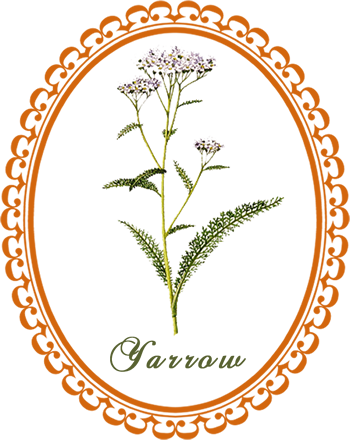
Yarrow: used by Herbalists to treat colds and fevers, digestive problems, and hay fever, as well as to lower high blood pressure and improve circulation ...
Common Names: Yarrow, Nosebleed, Milfoil, Wound Wort
Botanical Name: Achillea millefollium
Family: Asteraceae
Plant Type: Perennial
Parts Used: Leaves, stems, and flowers
Flowering: May to October
Native to Europe and Asia, Achillea is found in temperate regions worldwide. A sun-loving plant, it grows wild along roadsides and in meadows but is widely cultivated in gardens.
Description: Yarrow is a hardy herbaceous perennial that grows to a height of one to three feet tall and is entirely covered with tiny, silky white hairs. The rough, erect stems and deeply cut, feathery leaves are gray-green and aromatic. Small, strongly scented white to pale pink or lilac flowers appear from summer to autumn. The densely arranged flowers are borne on stems that branch at the top to form flattened terminal clusters.
Cultivation: Yarrow is a very hardy perennial. It likes moderately rich soil in full sun, and can often be found growing wild along the road.
Yarrow Magick
Courage. Love. Psychic Powers. Exorcism
Gender: Feminine
Planet: Venus
Element: water
Drink a tea made from yarrow flowers to improve psychic powers.
Use yarrow to exorcise evil and negativity from a person, place or thing.
Carry yarrow to bring love and attract friends and distant relatives you wish to contact.
Use yarrow in your wedding decorations to ensure your love will last at least seven years.
Herbal Healing with Yarrow
Cosmetic Uses: Yarrow is an astringent cleanser good for use in facial lotions.
Medicinal Actions: Abortifacient, analgesic, anthelmintic, anti-inflammatory, antiphlogistic, antiseptic, antispasmodic, aperitive, astringent, blood purifier, carminative, cholagogue, cicatrizant, diaphoretic, digestive, diuretic, emmenagogue, expectorant, febrifuge, healing, hemostatic, hepatic, hypotensor, insect repellent, laxative, stimulant (circulatory system), stomachic, sudorific, tonic, vulnerary (wounds)
Medicinal Uses: This herb has an action in many different systems of the body. Primarily, it is probably best known for its action in the respiratory system. Yarrow has the ability to cause peripheral blood vessels to dilate, which warms up the hands, feet and skin, and cools down the core of the body. Rather than suppressing a fever that accompanies maladies such as colds, flu and chest infections, yarrow helps your body's natural efforts to deal with infection by producing a sweat. Yarrow combines well with herbs like elder (Sambucus), peppermint (Mentha piperita) or ginger (Zingiber) for this purpose. Yarrow is also useful following flu or illness where there is little appetite as a tonic to promote digestion.
Yarrow helps lower blood pressure, clear blood clots, and slow the heartbeat. Used as part of a long-term management strategy, yarrow can help normalize blood pressure without the need for drugs, especially when taken with other herbs such as hawthorn (Crataegus) or linden flower (Tilia).
In the reproductive system it is known as a menstrual regulator, which also helps to reduce heavy bleeding. Conversely, it can also bring on a period.
Yarrow, together with plantain (Plantago lanceolata) and comfrey (Symphytum), will stop hemorrhages of the lungs, bowels, hemorrhoids, and other internal bleeding.
Dosage:
Infusion: Pour a cup of boiling water onto 1 - 2 teaspoonfuls of the dried herb and leave to infuse for 10 - 15 minutes. This should be drunk hot three times a day. When feverish it should be drunk hourly.
Tincture: take 2-4ml of the tincture three times a day.
Contraindications:
Avoid yarrow during pregnancy
Some people who take yarrow may occasionally develop an allergy or rash. Yarrow might increase sensitivity to sunlight. Yarrow should not be used to treat large, deep, or infected wounds, all of which require medical attention.
Body Care with Yarrow
- To encourage a cleansing sweat after a fever, take 1 cup yarrow infusion up to three times daily.
- To improve the body's nutrient absorption, take 1 tablespoon yarrow tonic wine before meals, as needed.
Infusion: 1/2 teaspoon dried or 1 teaspoon fresh yarrow flowers and/or leaves in 1 cup just-boiled water.
Tonic wine: 80g (3 oz) crushed fresh or dry yarrow flowers in 1 litre (4 cups) white wine for 30 days.
Source: The Essential Herbs Handbook by Lesley Bremness
If you appreciate the information provided,
please help keep this website running. Blessings!
© 2008-2025 aromaworx.ca. All rights reserved.

